'Thanks for taking out the tyrant'published at 18:01 GMT 15 November 2017
Zimbabwe's military has placed President Robert Mugabe under house arrest in the capital Harare.
Read MorePresident Mugabe has made his first public appearance
He attended a university graduation ceremony
Military still referring to him as "commander-in-chief"
But he is under growing pressure to resign
Huge rally planned to demand he steps down
Two African leaders urge him to go
China calls for "legal solution" to crisis
US demands "quick return to civilian rule"
Soldiers remain on the streets of the capital, Harare
Some government ministers have been detained
The whereabouts of Mr Mugabe's wife remain unclear
Dickens Olewe and Farouk Chothia
Zimbabwe's military has placed President Robert Mugabe under house arrest in the capital Harare.
Read More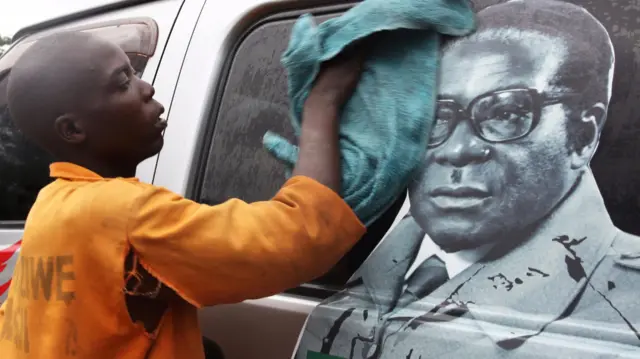 Image source, Reuters
Image source, ReutersLife has continued for some as usual today
Some Zimbabweans have been WhatsApping BBC Focus on Africa with their views on the military takeover.
A law student called Alexa said:
Quote MessageAt the University of Zimbabwe in Harare the atmosphere is tense from when we were coming to the campus in the morning. Soldiers were controlling the traffic, people are scared, examinations were supposed to commence today but all examinations have been suspended because of the uncertainty in the campus."
One man, who did not say where in Zimbabwe he was messaging from, said:
Quote MessageBasically now we got hope, now we believe in the new government, we believe in new laws and a better tomorrow for us and for the next generation.
Quote MessageI’m a 25-year-old male and my whole life I’ve never seen a new president, I’ve never seen a different way of government, so we are just happy, very hopeful and faithful that the future of Zimbabwe shines again, thank you.”
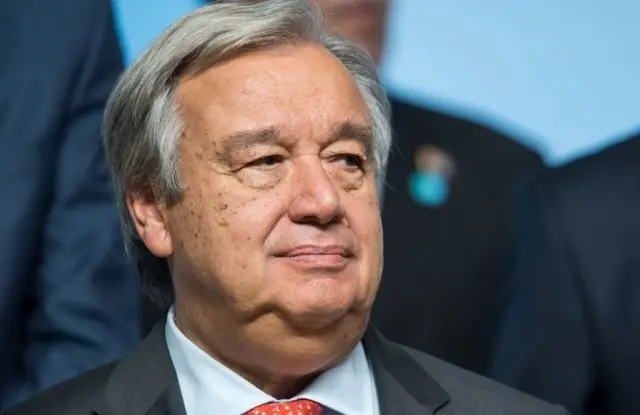 Image source, Getty Images
Image source, Getty ImagesThe UN chief called for dialogue in line with the country's constitution
UN chief Antonio Guterres has appealed for calm and restraint in Zimbabwe.
His spokesman, Farhan Haq, said the UN secretary-general was monitoring "the evolving situation", adding:
Quote MessagePreservation of fundamental rights, including freedom of speech and assembly, is of vital importance."
According to the AFP news agency, Mr Guterres also noted that the regional bloc, Sadc, was making efforts to end the crisis.
Earlier, South Africa's President Jacob Zuma said that he was sending an envoy to Zimbabwe on behalf of Sadc to speak to both sides.
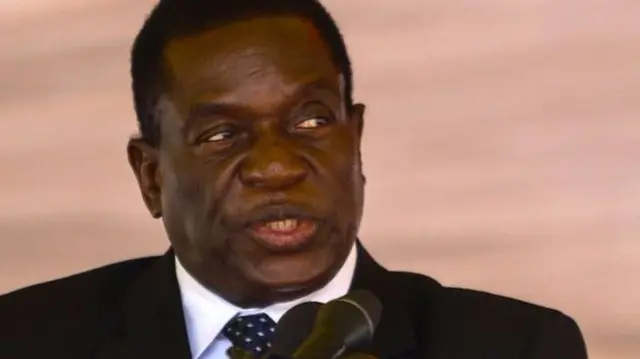 Image source, AFP
Image source, AFPEmmerson Mnangagwa, sacked as vice-president last week, was last seen in South Africa
Read more: The 'crocodile' who snapped back
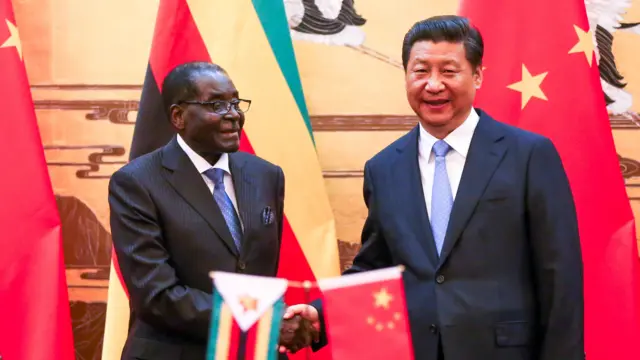 Image source, Getty Images
Image source, Getty ImagesZimbabwe and China have a close economic relationship
Military leader Gen Constantino Chiwenga’s trip to Beijing last week was described by the Chinese authorities as a "normal military exchange" – but that hasn’t stopped speculation about what might have been said.
Stephen Chan, a professor at the London School of Oriental and African Studies (Soas), told BBC World it was likely China had been appraised of recent developments:
Quote MessageI would be very surprised if they didn't have a very strong idea as to what was about to happen because while General Chiwenga was in China all kinds of machinations were taking place back in Zimbabwe, involving the removal of the vice-president, for instance
Quote MessageI'd be very surprised if he did not brief the Chinese on the various scenarios available."
He said the removal of President Robert Mugabe would likely benefit Beijing, Zimbabwe’s biggest trading partner, which wants to see a stable succession with the support of the military.
Zimbabwe’s arm of the Media Institute of Southern Africa (Misa) has been tweeting advice to journalists in a country that often takes a hostile line to freedom of the press.
Allow X content?
This article contains content provided by X. We ask for your permission before anything is loaded, as they may be using cookies and other technologies. You may want to read X’s cookie policy, external and privacy policy, external before accepting. To view this content choose ‘accept and continue’.
Allow X content?
This article contains content provided by X. We ask for your permission before anything is loaded, as they may be using cookies and other technologies. You may want to read X’s cookie policy, external and privacy policy, external before accepting. To view this content choose ‘accept and continue’.
Allow X content?
This article contains content provided by X. We ask for your permission before anything is loaded, as they may be using cookies and other technologies. You may want to read X’s cookie policy, external and privacy policy, external before accepting. To view this content choose ‘accept and continue’.
 Lerato Mbele
Lerato Mbele
BBC African Business Report
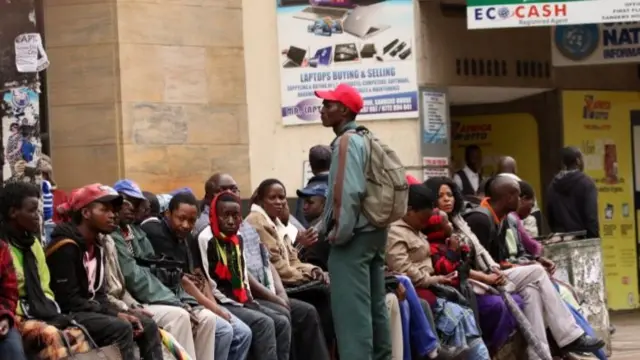 Image source, Reuters
Image source, ReutersPeople were queuing today at banks to withdraw money
“A political earthquake and its economic aftershocks” - that would be a fitting title for the current events unfolding in Zimbabwe.
The country has gone from one economic crisis to another over the last decade as it has struggled to recover from hyperinflation.
This year alone, unemployment is reportedly at 94% and the banks are constantly running out of hard currency. The country mainly uses US dollars and the South African rand after it abandoned its own currency in 2009.
It is against this backdrop that internet savvy Zimbabweans have started to explore the possibility of using the crypto-currency Bitcoin.
Following the news of a military takeover in Harare, the value of each Bitcoin being traded in Zimbabwe has gone up to nearly $14,000 (£10,600).
This is double its average global price at the moment.
It is a bonanza for the individual Zimbabweans who have bought of the currency online.
Those who have been brave enough to explore the uses of Bitcoin say it gives them access to a currency that is beyond the control of the Central Bank of Zimbabwe.
Bitcoin has also helped locals find an alternative to local banks, where customers are limited to how much they can take out each day. People also have little confidence in recently introduced local bond notes, which are pegged to US dollar.
Finally it is a platform for seamless transfers of money between Zimbabweans in the country and their relatives abroad.
Although most people still do not understand how Bitcoin works, the situation unfolding in Zimbabwe could be a catalyst for more widespread use of the virtual currency.
It could also motivate more widespread use of cyberspace transactions in nations across the continent.
After all, modern-day Africa is said to have leapfrogged several generations of the tech-revolution and even pioneered mobile-money transfers.
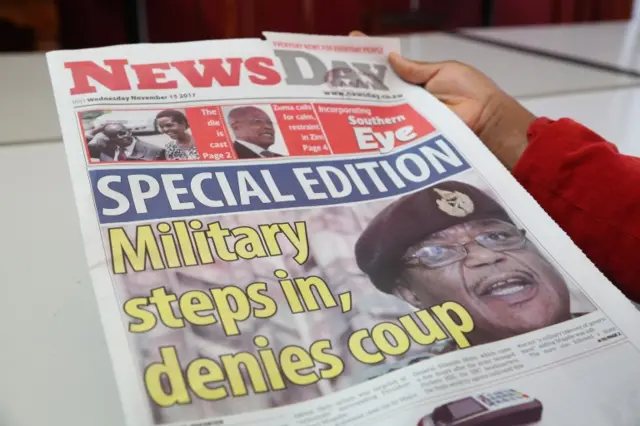 Image source, EPA
Image source, EPAThe military's actions overnight may have come out the blue for some people, but Zimbabweans have been watching this drama unfold for a long time.
At its heart is a fight over who will succeed President Robert Mugabe - a battle which has been brewing in the ruling Zanu-PF party for a number of years.
On one side is his wife Grace Mugabe, who has the support of the youth league and the so-called Gen 40s, parliament's younger MPs.
On the other side are the politicians, who, like Mr Mugabe, were part of the liberation struggle.
Mrs Mugabe's rise to power really started to escalate in 2014, with the ousting of her husband's deputy, and independence veteran, Joice Mujuru.
At the same time, she appeared to reveal her presidential ambitions - and people began to whisper about the Mugabe dynasty forming.
But it was not until she was linked to the removal of a second vice-president, Emmerson Mnangagwa, that she apparently overstepped the mark.
Mr Mnangagwa has powerful allies in the army and after he fled to South Africa, they decided to act.
You can read more about the key players in this crisis here, and about Mrs Mugabe's rise to power here.
You can also read a bit more analysis on why this was the last straw here.
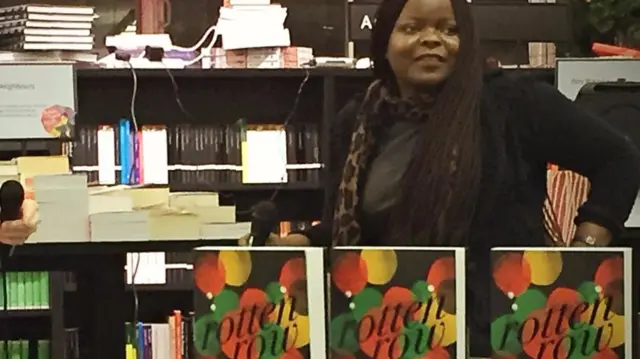
Petina Gappah's latest book Rotten Row, is a collection of short stories set in Zimbabwe
Prize-winning Zimbabwean author Petina Gappah, who is also a human rights lawyer, has told the BBC’s Newshour programme that her reaction to today’s events have been a mix of euphoria and trepidation:
Quote MessageTrepidation because you don’t want to the military to interfere in political affairs, but euphoria because this might mean the end of Robert Mugabe’s 37-year rule in Zimbabwe.
Quote Message“What Mugabe has been doing in the last five years has been to centralise power around himself.
Quote MessageHe has hollowed out state institutions and he’s hollowed out even his own party so that he can continue to rule unchallenged and then pass on power to a selected crony - and the fear had been that this selected crony would be his wife."
She said First Lady Grace Mugabe was “uniquely unqualified to be the president of anything” and many Zimbabweans had wanted a more democratic transition.
Quote MessageShe has been accused of corruption, she has a vicious temper… she has been accused of assaulting journalists and citizens of other countries.
Quote MessageWe wanted to see a transition from one president to another - not doing it through the family line as though the nation is an heirloom to be passed on."
She said that any Zimbabwean under the age of 37 had only known President Mugabe’s rule and ironically it has been younger party members that have been supporting him.
Quote MessageThat stunts the imagination. So what this has done, if he is going to resign - as we really hope he is going to do before the end of this week, it will open up the horizons and it will open up the possibility that any person can aspire to be president."
Ms Gappah said it was too early to say if life would improve for ordinary people:
Quote MessageWhat is certain is that life was getting worse under President Mugabe and life would certainly have got worse under Grace Mugabe – everything she touches turns to rust."
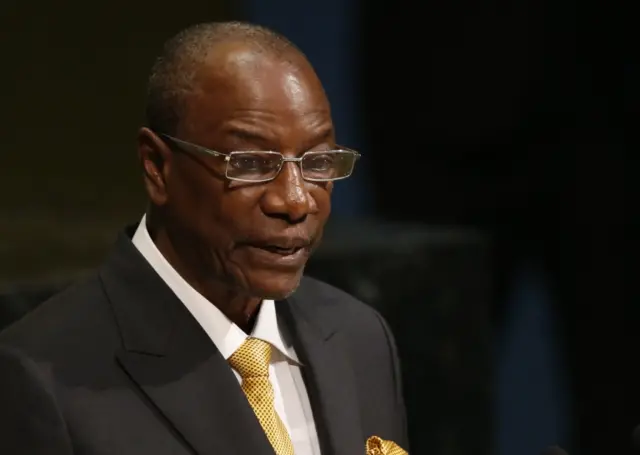 Image source, Reuters
Image source, ReutersAlpha Conde has led the African Union since January
Alpha Conde, who is also president of Guinea, has said the military takeover is "clearly soldiers trying to take power by force".
The African Union (AU) head called on the military to stop what they were doing - which he said "seems like a coup", according to news agency AFP.
This contradicts the Zimbabwean military's stance, which is that the events of the last 24 hours are not a coup.
Why are they so keen to avoid the term? The BBC's Kim Chakanetsa discusses it here.
There are also a few handy tips on recognising a coup in this article.
Zimbabwe's state-controlled Chronicle newspaper, which is based in the second city Bulawayo, has just published a special edition about the military crisis.
It goes with the headline "Army Steps In", saying the military has moved in to "weed out Zanu-PF criminal elements".
It has tweeted its front page:
Allow X content?
This article contains content provided by X. We ask for your permission before anything is loaded, as they may be using cookies and other technologies. You may want to read X’s cookie policy, external and privacy policy, external before accepting. To view this content choose ‘accept and continue’.
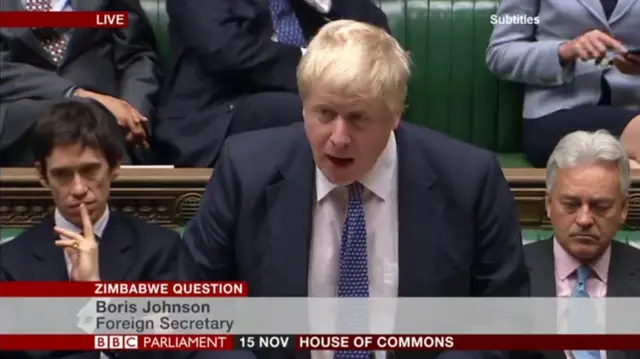
Speaking to British ministers in the House of Commons earlier, Foreign Secretary Boris Johnson addressed events in Zimbabwe:
Quote MessageWe cannot tell how developments in Zimbabwe will play out in the days ahead, and we do not know whether this marks the downfall of Mugabe or not. We call for calm and restraint.
Quote MessageAll Britain has ever wanted for Zimbabweans is to be able to decide their own future in free and fair elections.
Quote MessageMugabe’s consuming ambition was always to deny them that choice. And this House [of Commons] will remember the brutal litany of his 37 years in office. The elections he rigged and stole; the murder and torture of his opponents; the illegal seizure of land leading to the worst hyper-inflation in recorded history.
Quote MessageAuthoritarian rule, whether in Zimbabwe or anywhere else, should have no place in Africa... Elections are due to be held in the first half of next year. We will do all we can with our international partners to ensure this provides a genuine opportunity for all Zimbabweans to decide their future.”
Fellow Conservative party MP Rehamn Chishti called for Zimbabwe to be readmitted to the Commonwealth if it pursues democracy.
"Wouldn't it be wonderful?" replied Mr Johnson.
A Twitter account which monitors the media in Zimbabwe says some shops in the capital, Harare, closed early this afternoon.
Allow X content?
This article contains content provided by X. We ask for your permission before anything is loaded, as they may be using cookies and other technologies. You may want to read X’s cookie policy, external and privacy policy, external before accepting. To view this content choose ‘accept and continue’.
 BBC World Service
BBC World Service
Is Zimbabwe's former vice-president Emmerson Mnangagwa, nicknamed the "crocodile", behind the military takeover?
Local journalist Jeffrey Moyo gives the BBC World Service his perspective:
Who is the 'crocodile' and is he behind the military takeover in Zimbabwe?
Read this BBC profile of Emmerson Mnangagwa: Zimbabwe's 'crocodile'
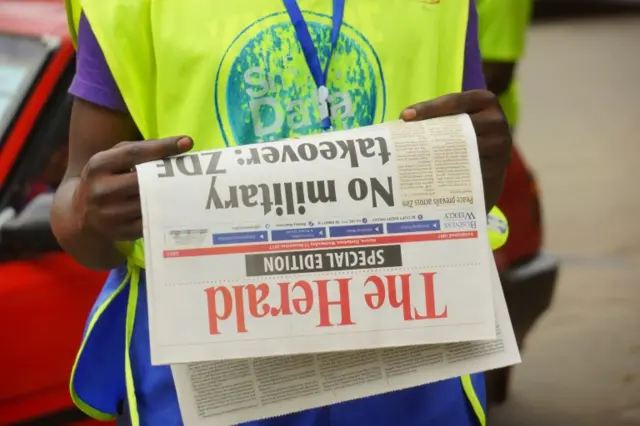 Image source, AFP
Image source, AFPUK-based human rights group Amnesty International has appealed to the military following events overnight.
Deprose Muchena, Amnesty's regional director for southern Africa, said:
Quote MessageAt this tense time, it is essential that the military ensure the safety and security of all people in Zimbabwe - regardless of their political allegiance - and refrain from any action that puts lives and human rights at risk.
Quote MessageMilitary officials must uphold human rights, including the right to liberty, freedom of expression, association and peaceful assembly.
Quote MessageThe free flow of information - through the media and social media - must be guaranteed.
Quote MessageThe military takeover should not be used as an excuse to undermine Zimbabwe’s international and regional human rights obligations and commitments.”
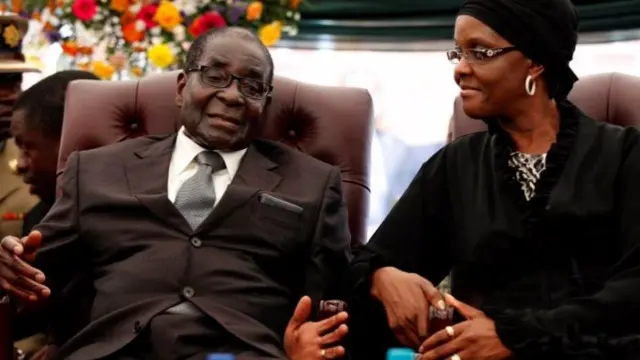 Image source, Reuters
Image source, ReutersGrace Mugabe's whereabouts is not confirmed
Namibia's private daily newspaper says the Namibian government has not commented on rumours that Zimbabwe's First Lady Grace Mugabe has arrived in the country:
But a Zimbabwean newspaper owner says Mrs Mugabe, 52, is still in the capital, Harare:
Moses Rono
BBC Monitoring
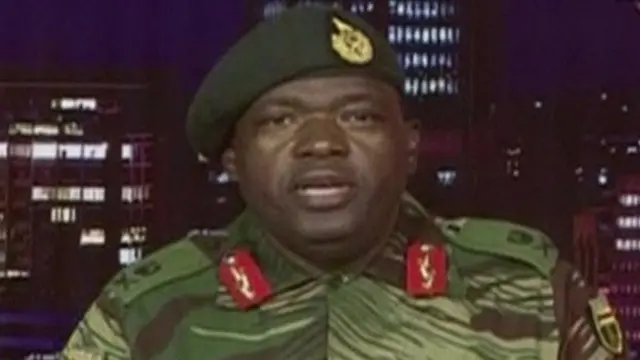 Image source, ZBC
Image source, ZBCUntil midday, state media was rebroadcasting Maj Gen Sibusiso Moyo's message and playing patriotic songs
Zimbabwe state television has resumed normal programming after playing patriotic liberation war songs for hours.
From just after midday local time (10:00 GMT) ZBC turned to its regular schedule, which included a drama programme, cartoons and the lunchtime news.
The first scheduled programme to air was Zimbabwe Awakens, a business slot in which guests spoke on economic issues.
The lead story on the main news bulletin was about the army taking power.
On state radio, which had been relaying the TV feed - local music is now airing.
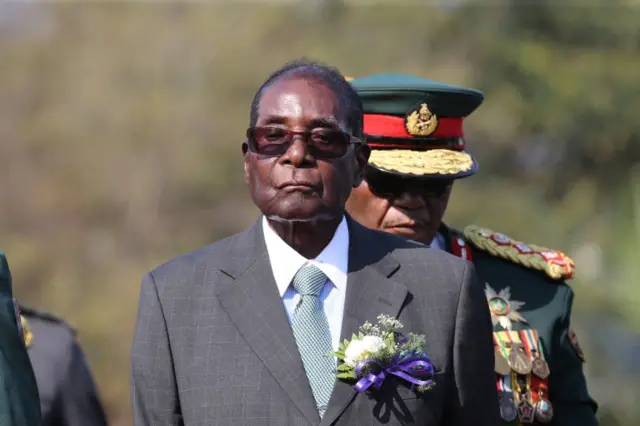 Image source, EPA
Image source, EPAThe military has always stood behind Robert Mugabe (pictured in August)
Zimbabwe's president has made some controversial and unpopular decisions over the past 37 years, so what was it about the removal of Vice-President Emmerson Mnangagwa which pushed the military to act?
Tomi Oladipo, the BBC Monitoring Africa security correspondent, has been considering just this point:
Quote MessageThe top military officials were part of the liberation struggle, like their comrade and president Mr Mugabe, so they have supported his government over the years because he has served their interests.
Quote MessageThey did not act this way in 2014, when Mr Mugabe sacked his previous Vice-President Joice Mujuru, a former independence fighter, in a similar power struggle.
Quote MessageThis time though, there is a sense the president might have gone too far."
You can read his full analysis about what tipped the balance in Zimbabwe by clicking here.
A Zimbabwean lawyer has been speaking to Al Jazeera about the ongoing political crisis.
Alex Magaisa, who is also a former adviser to Zimbabwean opposition leader Morgan Tsvangirai, says that President Robert Mugabe has been a beneficiary of the military involvement in politics, especially since 2002.
He says that Mr Mugabe was now "being eaten by a monster that he created":
Allow X content?
This article contains content provided by X. We ask for your permission before anything is loaded, as they may be using cookies and other technologies. You may want to read X’s cookie policy, external and privacy policy, external before accepting. To view this content choose ‘accept and continue’.
 BBC World Service
BBC World Service
BBC Africa's Kim Chakanetsa outlines the situation that has led to today's events to BBC Minute.
What prompted the army to take over?